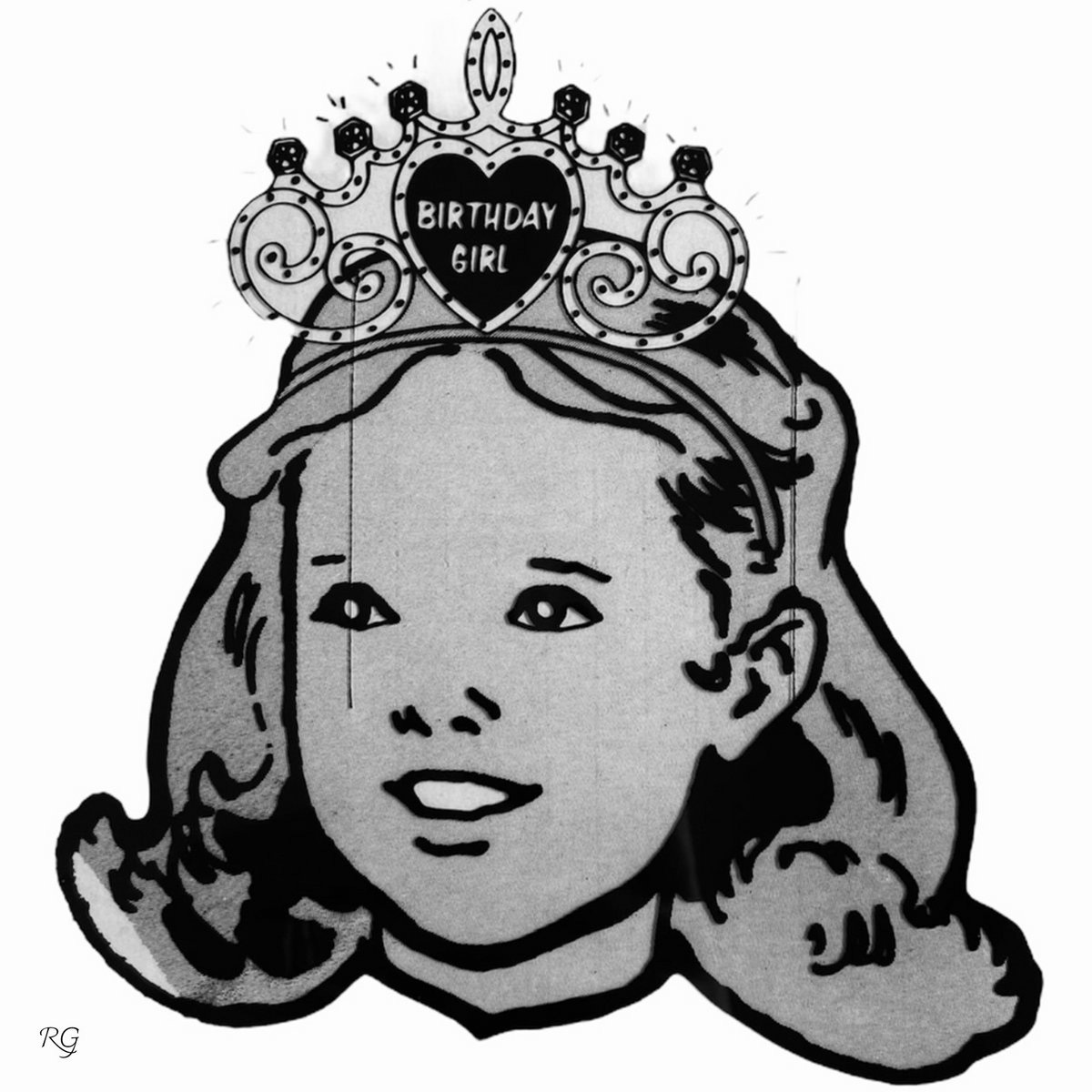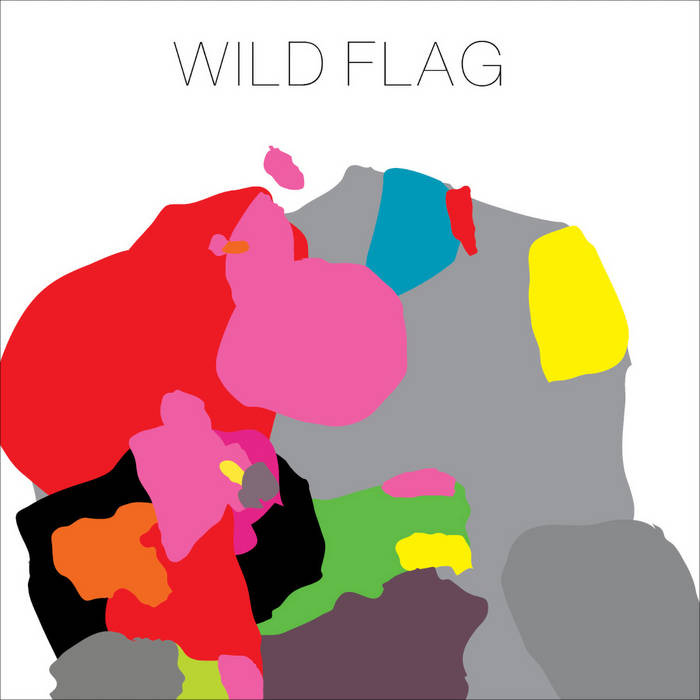This Presidents’ Day weekend, it’s time to honor Washington, DC. After all, the 6 Old Guys are a DC bunch – 4 of us federal workers, one of us a government lawyer for a neighboring state, and the last a rabbi leading a national social justice advocacy organization. And all of us steeped in the last few decades of DC music. So it’s time to give our hometown scene some love. Although America has yet to elect a woman president, we focus especially on women of DC rock and roll, ranging from high school students to quintessential “DC” writing/rocking to legends, including one of the best vocalists and songwriters in the city’s history in one of her multiple supergroups (and we give some thought to supergroups while we’re at it). We may not have representation in Congress, but we very much deserve a vote for best rock scene in the country.
New album: The Interrogator by The Paranoid Style. If our theme this week is DC bands, does it get any more representative of a certain segment of Washington than this? A literate, spirited indie garage rock-pop band fronted by a freelance journalist and pop culture critic that happens to be named for a 1964 Harper’s Magazine essay by a historian about conspiracy theory in right wing politics. All that’s missing is a law degree or a Rehoboth beach house (or a music blog). Thankfully, instead of hiding in a bunker and building a string board searching for Pepe Silvia (no link -- Google it yourself; it’s more fun), The Paranoid Style have released another album of fun guitar rock filled with clever lyrics and driving rhythms.
Led by singer/songwriter Elizabeth Nelson and her husband, guitarist Timothy Bracy, The Paranoid Style have been playing and recording since 2012, and the result is an up-tempo blend of garage rock and pop that mixes with Nelson’s sharp lyrics – their last album, 2022’s For Executive Meeting, featured references to P.G. Wodehouse, Steve Cropper, Doug Yule, and graphic artist/record sleeve designer Barney Bubbles - to form an irresistible combination. For their latest, The Interrogator, they are joined on guitar by Peter Holsapple of the classic power pop band The dB’s, among other projects. Adding Holsapple to the lineup makes The Interrogator feel like part of a continuum that connects back to ‘80s college rock bands like the aforementioned dB’s and famous Holsapple collaborators R.E.M., as well as fellow Georgians Guadalcanal Diary, Pylon and Let’s Active.
The Interrogator kicks off with the title track, a rowdy Texas boogie, in which Nelson comes off as bold and not taking any crap (“Jesus, for a tough guy you’re a sentimental son of a bitch / I find it unbecoming when you ask me just who I was with”). The next song, one of the album’s standouts, is “I Love the Sound of Structured Class,” and it sort of continues the Texas sound, in that it comes across as Eliminator-era ZZ Top channeled through Document-era R.E.M. while Nelson sings of “Sitting’ on the front porch / Still waiting on the lifeline / From the kind of folks / Who share opinions like mine.” Who can’t relate?
“That Drop is Steep” contains possibly my favorite lyric on the album (“Something about rock and roll makes me nervous for the future”) and is also the track that brings to mind Pylon, with Bracy and Holsapple’s jagged guitars mixed higher over Nelson’s vocals. “Last Night in Chickentown” has almost a retro-rockabilly-‘60s pop vibe, a la The B-52s, minus the hamming-it-up but including the perfect harmony vocals. The tempo slows down and Nelson gets reflective on “Are You Loathsome Tonight?” in which she notes that “ugly words are exchanged at a charity event” while “you don’t even have a tenth of your rent” and “people attack those with the lowest of defenses.” In the end, she asks, “You look in the mirror / and do you change your mind / does the fear breed fear / are you loathsome tonight?”
The Interrogator doesn’t stay downbeat for long. Another album standout, “Print the Legend,” a very Zevon-esque (drink) fable about a couple that “had a reasonable plan to make an ill-advised move” that resulted in a robbery, a shooting, and a double-cross. “Bad Day for the Group Chat” is twin guitar, jangly power pop, as if The Feelies released Only Life in the social media era (“Blasphemy contest / words out of context / Peep me in the comments / so what’cha gonna do about it?”). “The Ballad of Pertinent Information (Turn it On)” again brings to mind R.E.M., this time circa Reckoning or Fables of the Reconstruction, both in terms of music and wordplay (“Strawberry blonds in strawberry fields / debt conceals and debt reveals”). Album closer “The Findings” is keyboard-heavy with backing horns, percussion-free, and somber, and Nelson sings of “seething with the rage of contentment” while noting that “the youth movement always prevails” yet “then the youth movement always fails” because “they’ve got terrible timing.”
I initially discovered The Paranoid Style by reading Nelson’s commentaries on music and culture on the Hellscape Shitstorm Formerly Known as Twitter (better name than X, in my opinion). This led me to her band and her music writing, both of which I have enjoyed immensely. Discovering music in New York in the ‘80s, my understanding of the DC scene was limited to punk bands like Bad Brains, Minor Threat/Fugazi, and Dag Nasty. Moving to DC brought exposure to the city’s go-go history, and in my time here, I’ve seen DC’s hip hop scene develop and its indie rock landscape expand beyond its legendary beginnings at Dischord Records, Inner Ear Studios, and in the east coast wing of the Riot Grrrl movement. DC boasts a diverse array of talent (recent 6OG favorites have been the now-defunct post-punk band Priests and the currently active power pop band Bad Moves) that is well represented by The Paranoid Style. Anyone looking for intelligent, clever lyrics with music inspired by some of the best ‘80s college rock will enjoy The Interrogator; tin foil hat not required. (Brian)
Album from an upcoming/recent show: Birthday Girl by Birthday Girl. There are just too many options for how to start a post about Birthday Girl. There’s the fact that this is a band of high school students who’ve made a brilliant record. There’s the not-to-be-overlooked point that any high school students are picking up guitars, bass, and drums to play rock and roll. There’s the fact that that form of rock and roll is very much rooted in 90s indie rock and less the sounds that DC is known for (though bands like Unrest certainly made amazing non-hardcore in the 90s). And there’s the fact that two of these students bear the last names of the preeminent legends in those best-known DC sounds: MacKaye and Canty.
Let’s start with the last bit. You just need to ask the likes of Jason Bonham, Jakob Dylan, or Julian (or Sean) Lennon what it’s like to be the kid of legend and try to find your way in music. Perhaps some will think those are unfair or inappropriate comparisons, but for generations of punk rockers in DC and beyond, the names MacKaye and Canty are every bit as Rushmore-worthy (it’s Presidents’ Day, remember?) as Bonham, Dylan, and Lennon. There are examples of children who found their way – Rufus Wainright, Justin Townes Earle (RIP), several of the Marley and Kuti offspring – but it’s all too rare.
They’re only in high school, but I’m thrilled to report that Mabel Canty (daughter of drumming legend Brendan; of Rites of Spring, Fugazi, and now Messthetics fame) and Isabella MacKaye (daughter of Alec; niece of Ian and Amanda – all of them in too many bands to mention, so Google it; but dad Alec does currently lead Hammered Hulls, one of DC’s current supergroups, which also features Mary Timony -- more on all of that to come below) have started stronger than most. And the main reasons – (1) they seem unconcerned with their last names or the musical paths their specific elders paved in the 80s and 90s but instead are focused on other aspects of the music of those decades; (2) they are focused on being themselves, with lyrics, vocals, and music clearly within their wheelhouses, and (3) they are clearly having fun and enjoying the process, rather than seeming to be burdened by it all.
You can start with the opening track, “Run the Bath.” They make clear from the beginning: this is not hardcore. A simple but melodic riff opens into a tight indie rock sound reminiscent more of MacKaye family members the Evens than Minor Threat or Fugazi. There aren’t many rock songs of any sub-genre where the singer “triple dog dares” someone to look her in the face or is open enough to note “my mom says you’re calling.” (Is her mom looking at Mabel’s cell phone? Do they have a landline? Maybe this is the 80s after all?). When the chorus hits, the band takes it up several notches in volume and tempo, but the sound lands closer to 90s indie band Bettie Serveert’s classic Palomine than any DC-based records. What Mabel does so well in the chorus is not just sound more urgent, but as the chorus ends, she speaks more than sings. She’s not trying to hit keys she can’t reach or use a volume that wouldn’t fit her sound – she’s confident and comfortable enough to be herself. That’s impressive for a songwriter and vocalist of any age, let alone someone in high school.
In “House of Cards,” Mabel again references her mom, with a concern that the truth will make her mom less proud. So she opens up – again, not the stuff we were hearing about in DC hardcore. She goes back and forth between singing and something closer to speaking. It’s more deliberate and within herself, almost more of a conversation than a song. Like the opener, it draws you in, connects with you, but then you stay attentive when you realize how much is going on, reminiscent of the best songs by The Spinanes. This track, for me, is driven by drummer Tess Kontarinis, who drives it forward and makes her presence felt without overpowering the song. Isabella MacKaye’s bass also plays a key role in complementing Mabel’s vocals.
“Check Up” could be the standout track of the album. Literally centered on going to the doctor for a check-up, we learn a lot about Mabel: (i) like KEXP DJ John Richards, she hates Tuesdays (“those are the worst days;” “If I can outlive a Tuesday/I’d say I can do anything”); (ii) she’s getting stronger (“I took the shots/Well, I didn’t cry/I don’t do that anymore”); and (iii) she’s comfortable at age 16 (“I’ve reached the sweet age/And now I know what it was all for”). The lyrical journey is again matched by a strong riff on top of powerful but still-restrained drumming. It’s hard not to want to compare this track to “Doctor,” one of the classics from more recent DC punk legends Priests, who Brian referenced above. In “Doctor,” singer Katie Alice Greer goes directly at the medical establishment in her cynical (but still funny and endearing) way: “You put your fingers in other people’s mouths all day/Don’t you, doctor?” Priests pushed throughout their catalogue to show the hypocrisy and the vagaries of the systems that control us; Birthday Girl seems very comfortable in realizing they need time to figure it all out and not rushing too fast to get there.
Birthday Girl shows on a number of tracks -- “Stains,” “My Boy,” “All Good Things Must Come to an End,” “Ibuprofen” – that they can slow it down. On “My Boy,” which sounds at times a bit like Luna’s Bonnie and Clyde, Mabel is as vulnerable and honest as she is on any song, opening up about vulnerabilities and fears but not asking for any delicateness or extra support in response. The riff is matched with a strong bass line throughout, as if the bottom end of the music is holding her up through the journey. “Ibuprofen” again highlights the level of lyrical maturity (“Even priests don’t believe in God sometimes/So forgive me if your blood tastes just like wine”) and cleverness (“Maybe I’ll swig down an ibuprofen of your love”). The music gets bigger, with strings added, but somehow continues to keep you connected to the lyrics, vocals, and essential 90s indie sound.
Amid all these great songs, the defining track of this standout debut could be “Chess Not Checkers,” which breaks up the quieter second half. The band lets loose musically to get a bit fuzzier, and Mabel gets a bit sillier and looser in her vocals (rhyming “noogies” with “Huggies,” for example) with the sound of her voice seemingly buried a bit lower in the mix. She whoops a bit, the drums quicken a beat, and the music never sounds more 90s.
But the line that stands out for me in this song and overall as defining where Birthday Girl stands is “I need a grown-up to talk to.” This is not what your average band of high schoolers sings about, nor the sound your average high schoolers channel. So the clearest thing to say about Birthday Girl is: this simply is not your average band of high schoolers, whatever their last names. Check them out in DC on March 14 at the Black Cat (which, appropriately enough, is my birthday) opening for Mary Timony. (Brad)
Speaking of…
Album being rediscovered (at least 10 years old): Wild Flag by Wild Flag. Prompted by Brian’s recent review of the new Sleater-Kinney record, the coming Mary Timony show with Birthday Girl and new album, and boygenius’ Grammy wins prompting reflections on women-in-rock supergroups (I mean, you know it’s a thing if Barron’s is publishing about it), I turned back to an album from 2011 that intersects with all of this: the self-titled album by Wild Flag, their only release.
Wild Flag was a supergroup consisting of then-on-hiatus-Sleater-Kinney members Carrie Brownstein and Janet Weiss, the Minders’ Rebecca Cole, and DC’s Mary Timony. By that point, Mary was a solo artist, but she grew up in the 80s DC scene as a member of such bands as Autoclave, went to Boston U. for college and became an indie rock darling with Helium, then returned to DC to join a range of bands. Wild Flag was an exciting combination and blend of sounds and styles, and that came through live. I had the chance to see them a few times in DC, and they always delivered, seeming to relish the opportunity to jam with friends on home turf (at least for Mary) and see where it took them.
I remember enjoying the record at the time but have not gone back to it in ages. On re-listen, it highlights a few things that have always stood out to me about supergroups as a fan: (i) the parts of the supergroup you like going in will stand out as the best parts, and you will wish that the parts you don’t like were featured less; (ii) one album is almost never enough for a supergroup to get things figured out (see: boygenius), and (iii) the best moments on a supergroup record will often be as good, or even better, than what the individual members do on their own, but they’re usually just moments.
Applied here:
I love Mary Timony’s vocals, and I do not love Carrie Brownstein’s; thus, I wish Mary sang all of the songs. I think the music on the song “Boom” is close to the best on the record, but Carrie’s singing performance is almost unlistenable.
There are some incredible moments on a few songs as discussed below, but as a whole, the record is fine. Not more, not less. Fine.
Mostly it feels like they’re figuring it out, and I would have been confident that the second Wild Flag record would have been great. But, alas, we only got one. Carrie had a TV career already in 2011 as the co-creator of Portlandia, then she and Janet went back to Sleater-Kinney (and then Janet left after realizing they’d made a terrible album with St. Vincent at the board), Mary formed Ex-Hex (and now puts out solo records and plays in Hammered Hulls on the side), and Rebecca has done a range of projects and played in Pavement’s touring band. Meaning: they’re doing just fine, of course.
The standout tracks, as a Mary fan, are “Black Tiles” and “Glass Tambourine,” both of which have the perfect Mary Timony elements: super catchy riffs, just-short-of-ironic guitar solos, bouncy rhythms, and slightly off-kilter but simple lyrics that you’re thrilled to sing along to. “Black Tiles” is as good as any song as Mary has made since her Helium days, driven by the full range of the band, especially Janet’s drumming. “Glass Tambourine” adds in lovely harmonies and more segmentation, another Mary Timony signature, with some louder guitar flourishes that perhaps gave a preview of where Mary would head with Ex Hex.
The rest of the songs end up running together. Having two of the guitar greats of the last 35-ish (yikes, we really are old) years playing together is always a treat, and their interplay is fun to listen to on tracks like “Electric Band” (and appropriately for a band with two great guitar players, they used to cover Television’s “See No Evil” live). The keyboards, too, stand out at times, such as when they take over during the bridges of “Endless Talk” or punctuate the opening track, “Romance.” The Carrie song “Racehorse” was always the most energetic and thrilling during live shows with simple lyrics (mostly repetitions of “I’m a racehorse, yeah I’m a racehorse/You put your money on me”) and fairly obvious but fun chorus (“We’re in the money).”
“Racehorse” live lent itself to Townshend-ian windmills, Carrie and Mary leaning back to back while shredding, Janet pulsing the song forward as hard as she could, Rebecca jumping up while banging the keys. At those moments in the shows and at points on the album, it felt like this band could go somewhere new and interesting together, and maybe I could have even put up with Carrie’s vocals. But like with most any supergroup, those were moments and not the core. The pieces never became more than the whole; the great moments are worth going back to if you must, but I’d probably just reach for Helium, Ex Hex, or Dig Me Out in a pinch. (Brad)
(Cover photo taken from here at DC’s Fort Reno series; credit Brendan Canty)








I’ve been digging The Interrogator. Doesn’t seem like Nelson plays live shows, which is too bad. Really wish Priests was still making music.
I appreciate the shout-out to Let’s Active and the Athens scene.